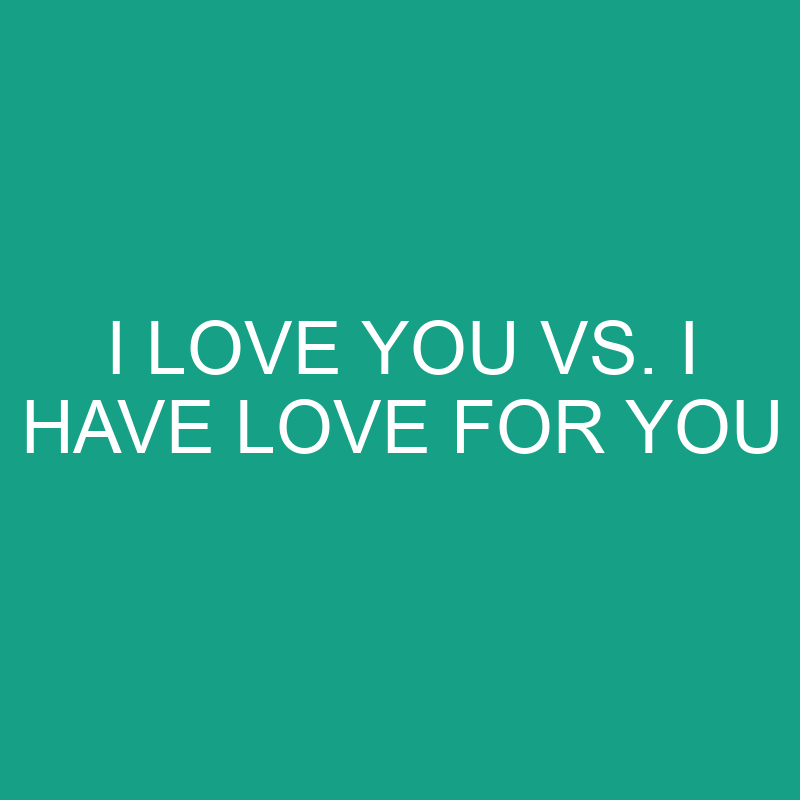The phrases “I love you” and “I have love for you” may seem similar, but they carry distinct nuances in meaning and connotation. The differences lie in the depth of emotion, the nature of the relationship, and the level of commitment expressed. Let’s explore the implications and contexts associated with each expression.
Post Contents
“I Love You”
1. Profound Emotion:
- Depth of Feeling: Saying “I love you” typically conveys deep and intense emotions. It signifies a profound connection and a strong affection for the person.
2. Romantic Connotation:
- In Romantic Relationships: “I love you” is commonly associated with romantic love. It expresses romantic feelings and a commitment to the well-being and happiness of the other person.
3. Commitment and Devotion:
- Long-term Commitment: Uttering these words often implies a commitment beyond the present moment. It suggests a willingness to invest in the relationship for the long term.
4. Versatility:
- Applicability: While commonly used in romantic relationships, “I love you” can also be used in familial relationships, friendships, and even in a broader, platonic sense to express deep care and connection.
“I Have Love for You”
1. Affection and Care:
- Positive Feelings: “I have love for you” expresses a positive sentiment and affection. However, it may not carry the same depth of emotion as “I love you.”
2. Friendship and Connection:
- In Friendships: This phrase is often used in friendships to convey a strong bond and care for a friend. It indicates a level of emotional connection without necessarily implying romantic feelings.
3. Cautious Expression:
- Emotional Restraint: “I have love for you” might be chosen when the speaker wants to express care but with a certain degree of emotional restraint. It can be a way of acknowledging a connection without necessarily committing to deeper emotions.
4. Wider Applicability:
- Broader Relationships: While “I love you” is often reserved for close, intimate relationships, “I have love for you” can be used more broadly. It might be employed to express positive feelings toward acquaintances, colleagues, or even in a general sense of goodwill.
Choosing the Right Expression
1. Consider the Relationship:
- Nature of Relationship: The choice between the two expressions depends on the nature of the relationship. “I love you” is typically reserved for deeper, more intimate connections, while “I have love for you” can be used in various relationships.
2. Understanding the Intensity:
- Depth of Emotion: If the emotions are intense, profound, and romantic, “I love you” is likely the more appropriate expression. If the feelings are positive and caring but less intense, “I have love for you” might be fitting.
3. Communication Style:
- Comfort Level: Consider your own comfort level with expressing emotions. Some people might find it easier to say “I have love for you” as a way of conveying care without diving into the intensity associated with “I love you.”
4. Recipient’s Sensitivity:
- Recipient’s Feelings: It’s also crucial to consider the feelings of the person to whom the expression is directed. Some individuals may be more comfortable with one phrase over the other based on their own perceptions and experiences.
Conclusion: Communicating Affection
In matters of the heart and human connections, the choice of words holds significant weight. “I love you” and “I have love for you” are both beautiful expressions, each with its own place in the spectrum of human emotions. The key is to use them thoughtfully, considering the depth of feelings, the nature of the relationship, and the comfort levels of both the speaker and the recipient. Whether expressing profound romantic love or conveying positive sentiments in a friendship, the goal is to authentically communicate affection and care.
